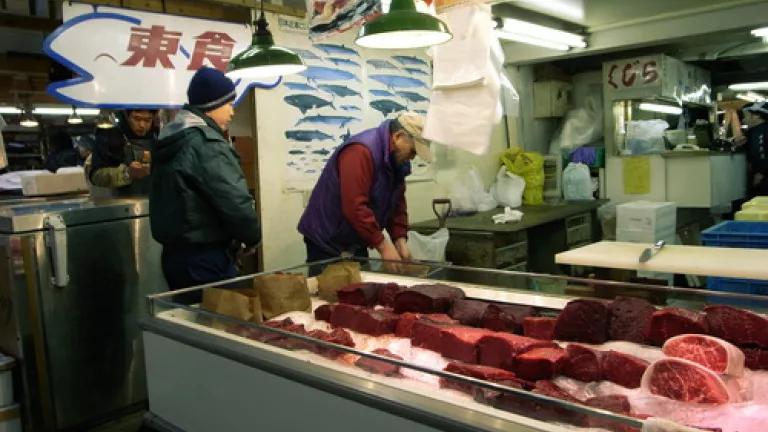This Week in Whales: Navy Moving Forward With Plans to Harm Millions of Whales/Dolphins; the Market Can Solve All Problems and Other Nonsense...

Whale meat for sale in a Tokyo, Japan fishmarket
- Last Friday (August 30), the Navy released two Environmental Impact Statements assessing the impacts its training and testing activities will have in waters off the East Coast, the Gulf of Mexico, Southern California, and Hawaii from 2014 through 2019 (the accompanying video to the link is interesting for its many, shall we say, “fictional” qualities). The Navy expects to kill over 340 whales and dolphins—estimates that, as my colleague Michael Jasny notes, are lowball estimates that do not take into account the training and testing's disruptive effect on whale feeding and migration patterns, which ultimately harm individuals as well as whole populations of cetaceans. Scientific advances in mitigation technologies—such as ocean gliders and habitat modeling—would help protect whales in the future.
- Some economists have proposed the creation of a "properly regulated market in whales"—akin to the catch-share models that have saved some fisheries from collapse or the cap-and-trade model for regulating carbon emissions. They claim that pricing whales would, in fact, save them. Economists proposed similar regulations to the International Whaling Commission (IWC) last year. As my colleague blogged then and as I will reiterate now: putting a price on whales will not save them. Commercial whaling—even under the guise of scientific research—is a pointless and reprehensible endeavor. Period. Market forces can’t cure all problems and in many instances inappropriately shift burdens. For example, in the article above, the author says that “Whale auctions would attract green donations to reduce catches below the quota.” Great, so now environmentalists have to spend our limited resources to stop Japan from doing something that’s already illegal? Sounds like a perfect system. Maybe there are other market schemes we can dream up to force well-meaning individuals to pay to keep bad actors from breaking the law or taking responsibility for their actions. See, market solutions solve everything. For example, we can get rid of rape by having all the people opposed to it buy up the rape quotas. Yay, problems solved by the market.
- While we’re on the topic of dumb markets and whales, we should remember that there is no demand for whale meat! Unfortunately, Japanese and Icelandic whaling devotees will continue to try and find ways to foist whale meat on people who don't want it. Case in point: luxury dog food snacks made from fin whales.
- Taiwanese scientists have developed a litmus test that can discern in 10 minutes whether or not a tissue sample comes from an illegally-poached whale or dolphin—the test is a fast, easy alternative to expensive DNA tests, which take five days to process. Taiwanese coastguard and government officials will use the litmus paper to help enforce Taiwan's stringent conservation laws, which protect all cetacean species (except from fisheries bycatch—but that’s a different story). Credit where it’s due: Great job, Taiwan!
- A Real Housewife of Miami has posed naked in a bathtub for a PETA campaign aimed at drawing attention to the inhumane conditions whales in captivity endure. I guess all press is good press?
- For the past few weeks, I have been posting on developments regarding the Unusual Mortality Event (UME) on the East Coast. As of Sunday, there have been more than 488 dolphin strandings from New York to North Carolina. Scientists at the National Oceanic and Atmospheric Association are naming the likely cause of death as mobillivirus, a virus similar to measles. There is nothing they can do to stop the spread of the virus, and, unfortunately NOAA expects it to travel further south until finally tapering off next spring.
Meanwhile, this week in Wales…
A small population of Risso's dolphin—a rare and unusual breed—have made their home along the coast of North Wales. Hopefully Welsh officials will adopt Risso's dolphin-specific conservation efforts to protect this unique species.
Photo credit: WikiCommons

